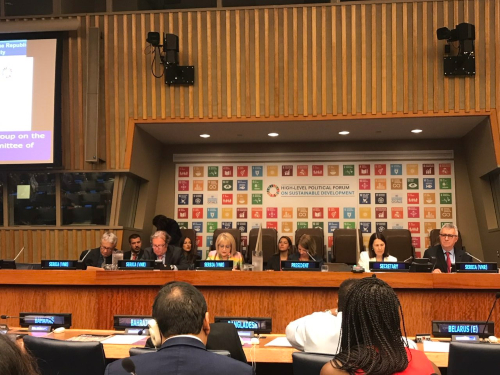Prof. Dr. Slavica Djukić-Dejanović, Minister without Portfolio in charge of Demography and Population Policies and the Chair of the Inter-Ministerial Working Group for the Implementation of the 2030 Agenda for Sustainable Development of the Republic of Serbia, headed the Serbian delegation to a four-day ministerial meeting of the High-Level Political Forum on Sustainable Development, held in the United Nations Headquarters in New York from 16 to 19 July 2019. The theme of this year's meeting was "empowering people and ensuring inclusiveness and equality," during which 47 United Nations Member States, including Serbia, presented their Voluntary National Reviews on the implementation of the 2030 Agenda for Sustainable Development.
In presenting Serbia’s VNR Report, Minister Djukić-Dejanović pointed out that the process of the implementation of the 2030 Agenda in Serbia was more than a mere writing of a document. It was, she said, an assessment of mutual cooperation and the sharing of experiences, challenges and good practices among government agencies, local self-government, civil society, business people, international organizations and other stakeholders. The central part of the Report, the Minister went on to say, encompassed the views of the young people and the assessment of the Standing Conference of Towns and Municipalities as a unique and unified voice of the units of local self-government. "The vision of a sustainable future that we share with our children and young people takes central stage in this report, because today's children and young people will be the leaders of society and social change in 2030”, said the Minister and emphasized the importance of the units of local self-government in the implementation of the 2030 Agenda in the country and bringing about progress to all its citizens.
Prof. Dr. Milorad Mijatović, Chairman of the Focus Group of the National Assembly of the Republic of Serbia for Developing Control Mechanisms for the Process of the Implementation and Monitoring of the Sustainable Development Goals (SDGs), informed of the activities of the National Assembly in following the SDGs implementation in the last two years and advised of future activities. “Two types of activities are ahead of us in the forthcoming period,” he said. “On the one hand, we are to raise the awareness of the public through the media, both at local and national levels, in order to highlight the importance of a proper SDGs implementation. On the other, we plan to start a country-wide campaign in which MPs will talk primarily to young people, from pre-school, elementary and secondary school to university, of the importance of the implementation for their future. The conversation will also include local self-government agencies, citizens’ associations and the media. Our intention is to hear of their needs and ideas as to how to make Serbia a better place to live in,” concluded Prof. Mijatović.
Ms Tijana Čupić, the youth delegate of the Republic of Serbia to the United Nations, introduced a short film about the views of young people about the SDGs. The film was made and presented at the United Nations Headquarters in cooperation with UNICEF Serbia; it featured the evaluation of young people of the progress achieved in, and their expectations from, the SDGs implementation.
The same day, Minister Djukić-Dejanović took part in the High-Level Political Forum general debate. Officials in the debate pointed to the numerous challenges that countries, especially the least developed ones, face in various parts of the world in the implementation of the 2030 Agenda and stressed the need for necessary political commitment and strengthening partnerships among the public and private sectors, civil society and academia. The Minister pointed out that the meeting provided an opportunity to highlight, in the United Nations Headquarters and in the presence of a large number of United Nations Member-States and civil society representatives, the importance of the SDGs implementation and the process of Euro-integrations in Serbia. She reiterated Serbia’s commitment to the implementation of the 2030 Agenda and the achievement of all its goals, as well as to the promotion of regional cooperation in this area. She recalled that Belgrade hosted a Subregional Conference on promoting progress in implementing the 2030 Agenda. The Conference was assessed as very successful and provided a solid basis for the continuation of regional cooperation in the pursuit of the SDGs.

Finally, Minister Djukić-Dejanović participated, as one of the main panelists, in the side event organized by the United Nations Entity for Gender Equality and the Empowerment of Women (UN Women) on the margins of the High-Level Political Forum, on gender-responsive budgeting. In answering a question, she said that the introduction of gender-responsive budgeting in 2015 sets out Serbia as the only country in the region to have done so and provides an example of good practices. She went on to say that Serbia was the only country outside the European Union to launch the Gender Equality Index in 2016 and added that, compared to the European average, considerable progress had been made between the two reporting periods and that the index now stands at 55.8 points. The Minister concluded that Serbia would continue to promote gender equality, particularly in employment and with respect to equal pay for equal work. She also explained that, more often than not, women are charged with the care of children and the family and give care to a sick member of the family.
This year’s High-Level Political Forum gathered together a large number of high-ranking officials and was assessed as very successful. The participation of the delegation of the Republic of Serbia and the presentation of its first VNR made a significant contribution to the image of the country as a reliable partner, firmly committed to the 2030 Agenda and sustainable development.